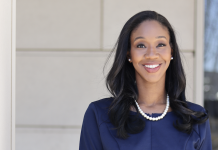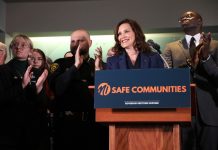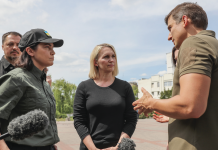Fifty minutes into a historic Zoom event (which you can watch above), Oakland County Executive Dave Coulter couldn’t contain his amazement any longer. “Maybe it’s because I’m the old-timer here who’s been in office for 19 years, but I get chills seeing all the young faces on this call,” said Coulter who, at 60, was elected last year as the state’s first openly gay county executive. “I love the fact that here we are in 2021 and so many intelligent, creative, and talented people get to pursue their dreams in politics.”
He wasn’t the only one. When Hour Detroit decided to host an event featuring as many of the 17 openly LGBTQ elected officials serving across the metro Detroit region as could attend, nobody expected almost all of them to appear. The summit, which streamed live on Facebook in mid-April, could have devolved into another unwieldy pandemic-era digital cacophony — and it is true that the large number of participants made it impossible, even in nearly two hours, to give everyone ample time to speak.
But the crowded event served a purpose beyond the specifics of what anybody said; it was a visual illustration of the dramatic gains made by a community that until recently struggled for political representation. The attendees seemed gleeful to note their diversity in terms of race, age, gender, and office; the 13 included three school board members, five city councilors, three county officials, and two state legislators.
“When I was first elected 10 years ago, you could not have a Zoom full of LGBT elected officials in the state of Michigan or metro Detroit like we have right here today,” said State Sen. Jeremy Moss, 36, who in 2018 became the first out state senator after two terms as history’s second out state representative. Of that first campaign, in 2011 for Southfield City Council, Moss recalled: “I was young, recently out, and I didn’t know how to talk about being gay. It was something I really tried to avoid. But as we talked about what progress we needed to make on, I became more comfortable and the state of Michigan became more comfortable and started to elect openly LGBTQ candidates. … Decades ago, maybe it was a liability to run as openly gay. In 2021, it’s a liability to run as a homophobic candidate.”
Indeed, Michigan, despite a legislature dominated by conservative Republicans, is a national leader, with a total of 36 out LGBTQ elected officials, according to the nonprofit Victory Institute. Just four states — New York, Illinois, California, and Pennsylvania — have more, and in Attorney General Dana Nessel, Michigan is one of just six states to elect an LGBTQ candidate to statewide office.
“Maybe 20 or 30 years ago, people couldn’t conceive of how LGBTQ people could serve openly in office,” said Katie Scott, who in 2018 became the first out lesbian elected to the Washtenaw County Commission. “Now we’re out there and that changes the dynamic of what people are seeing.”
Still, it was notable that 16 of 17 out officials in Southeast Michigan hail from either Oakland or Washtenaw counties, a fact that frustrated some summit viewers who complained on Facebook about the seeming omissions of Wayne and Macomb counties. Specifically, the Oakland County contingent dominated, with elected folks clustered around Hazel Park, Huntington Woods, Southfield, and Ferndale. Those cities are known for their LGBTQ communities; Coulter was Ferndale mayor before he was appointed in 2019 to serve out the term of the late County Executive L. Brooks Patterson, and Hazel Park was home to the lesbian couple whose lawsuit led to a 2015 U.S. Supreme Court ruling legalizing same-sex marriage across the country. Coulter’s Ferndale predecessor, Craig Covey, was elected in 2008 as Michigan’s first out mayor.
Hazel Park councilmember Mike McFall, who is gay, rejected the idea that the LGBTQ fight is over in progressive enclaves like his. Only this year, he noted, his council passed an LGBTQ-inclusive nondiscrimination law. “This tends to be a friendlier place, but the battle’s never over,” he said.
Some 50 Michigan communities have similar laws, according to the Oakland Press. But the holy grail for forum attendees is the addition of sexual orientation, gender identity, and gender expression to the state’s Elliot-Larson Civil Rights Act. Moss, who represents the Oakland County region, and Rep. Laurie Pohutsky, who is bisexual and represents Livonia, said they hope to pass it this year now that they’ve obtained Republican co-sponsors in both chambers.
“There absolutely are the votes to get this through the Senate, and Jeremy and I have both had phone calls from corporate stakeholders who are very excited to get this through,” says Pohutsky, of support from big business in Michigan. “The one roadblock is that we make sure there are transgender protections that are maintained. A lot of the compromise proposals drop the ‘T’ or put really heinous trans language in. That is a non-starter.”
The state has zero transgender officeholders, and there are just 38 trans elected officials across 20 states, according to the Victory Institute. “If there is a trans person out there who is thinking about it, please, do [run],” Scott said. “Every one of us is asking you to do this.”
Most summit attendees were the state’s first elected out LGBTQ people in their positions. But usually the motivating factor for running is broader. Amani Johnson, at 24, is a member of the Southfield Public Schools Board of Education who ran in 2020 to expand the district’s offerings in skilled trades. Pontiac School Board President Mike McGuinness ran to save the district from financial ruin. “Sometimes I wrestle with how strident I want to be on LGBTQ matters,” said McGuinness, who was elected in 2016. “There hasn’t been much room for conversation about much beyond these financial survival matters.”
Still, Saline Area Schools Board member Susan Estep says her passion for LGBTQ rights propelled her to run. When she, her wife, and their newborn son moved to the rural Washtenaw County region in 2010, the district was debating whether to add sexual orientation, gender identity, and gender expression to its nondiscrimination policy. Estep urged members to do so at a board meeting, and when they rejected the proposal, she vowed to run someday. In 2018, she was the top vote-getter among six candidates for two seats.
Even so, she’s struggled to push through a measure to protect transgender and gender-nonconforming students. “I’ve had great pushback from the leadership, which is unfortunate,” she said.
That’s a far cry from Ferndale, which famously painted a crosswalk in rainbow colors to show its LGBTQ support, or Huntington Woods, where in 2019 hundreds attended a city commission meeting to support a library program in which drag queens read stories to children that was under fire from conservatives.
But even in those progressive regions, gaps in awareness and protection exist. In Washtenaw County, for instance, Scott and fellow Commissioner Jason Morgan shepherded a policy change last year to ensure that transgender people may use the public restrooms that align with their gender identities. Southfield City Council member Jason Hoskins said he’s pleased the city finally approved an LGBTQ Pride Month resolution in 2019, his first year in office. Hoskins and Johnson also said they believe their presence as Black gay men in elected office in Southfield matters. “It is more challenging to be openly gay in a majority Black community and run for office, just because there is homophobia in the Black community and that can be terrifying for candidates,” Johnson said.
Hazel Park City Council member Luke Londo, similarly, said his being openly bisexual is important because it fosters greater visibility: “Bi erasure is a real phenomenon. We tend to be underrepresented not just in politics but in every public-facing career. I’m proud of who I am, my wife’s proud of who I am, and I think it’s important to be open and transparent with the public.”
Moss said that while the forum was important and novel, he envisions a time when it wouldn’t be news and there will be too many LGBTQ elected officials to cram into a Zoom room. “It shouldn’t be remarkable that LGBTQ people or people of color or young people run for office,” he said. “That should be expected. When I talk about LGBTQ issues on the Senate floor, nobody’s ever done that before from our perspective. I ran and I was the first, but I didn’t run to be the only.”
About the Out
Here’s an alphabetical list of all known LGBTQ elected officials representing metro Detroit communities

*Bolded names participated in Hour’s LGBTQ Virtual Summit
Dave Coulter, Oakland County executive
Susan Estep, Saline Area School Board member
Jason Hoskins, Southfield City Council member
Amani Johnson, Southfield School Board member
Luke Londo, Hazel Park City Council member
Mike McFall, Hazel Park City Council member
Mike McGuinness, Pontiac School Board president
Jason Morgan, Washtenaw County commissioner
Jeremy Moss, State Sen.
Brad O’Conner, Ypsilanti parks commissioner
Greg Pawlica, Ferndale City Council member
Laurie Pohutsky, State Rep.
Travis Radina, Ann Arbor City Council member
Joe Rozell, Huntington Woods city commissioner
Bret Scott, Pleasant Ridge City commissioner
Katie Scott, Washtenaw County commissioner
Ken Siver, Southfield mayor
|
|
|









